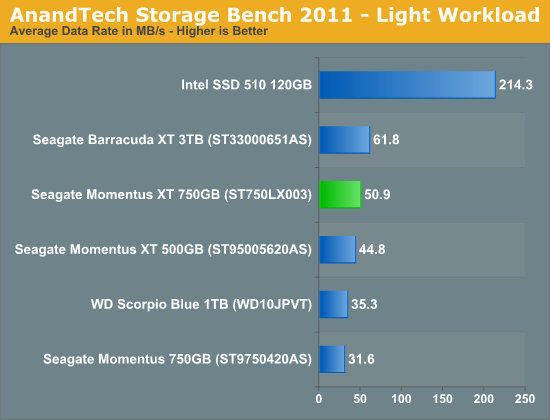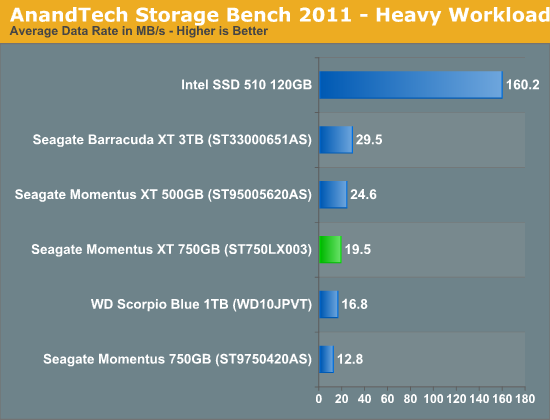Seagate 2nd Generation Momentus XT (750GB) Hybrid HDD Review
by Anand Lal Shimpi on December 13, 2011 12:51 AM EST- Posted in
- Storage
- Seagate
- Momentus XT
- Hybrid Drive
- HDDs
- SSHDs
AnandTech Storage Bench 2011
Admittedly most of the benchmarks on the previous page really portray the Momentus XT in the best light possible. The workloads are light enough to mate well with the 8GB cache and none of them are really write intensive. Over time however you'll encounter more varied workloads, including those that are write intensive or those that only access data once or twice. In workloads that aren't perfectly tailored to the Momentus XT's cache, the honeymoon is over before it began. We'll start with our light storage bench:

Here overall performance is definitely higher than any of the 2.5" drive offerings, including last year's 500GB Momentus XT. However compared to the 3.5" Barracuda XT, the newer Momentus XT is tangibly slower over the course of our test. If you look at performance compared to the Intel SSD 510, there's simply no competition.
Our trace based Storage Bench suites were designed to really stress SSDs, thus being more write intensive than your typical client workload. Not being able to cache writes at this point, the Momentus XT is penalized (perhaps unfairly) in these benchmarks. The results are valid however - when it comes to writing or non-repetitive workloads, the Momentus XT will perform like a good 2.5" hard drive rather than in the realm of SSD performance.
Our Heavy Storage Bench workload is even more write intensive. Furthermore, having been recorded on a Windows 7 pre-SP1 install, we see some of the potential penalties from moving to a 4KB sector drive. Most writes are 4KB aligned in Windows 7, however pre-SP1 there were still some significant cases where alignment could be an issue. Here we see the 750GB/4KB Momentus XT actually fall behind the 500GB drive with 512B sectors because of this difference:

I included these results because if you formatted your drive with Windows 7 and later applied SP1 to the install, you may see this sort of performance regression when moving to a 4KB sector drive. The only way to avoid this is to reformat your drive using Windows 7 SP1 and install from a Windows 7 SP1 DVD/image. In place upgrades won't avoid the alignment issues that are exhibited here. For a greater understanding of why 4KB sectors are necessary and why alignment can be problematic on these drives, have a look at our coverage here.










98 Comments
View All Comments
wagsbags - Tuesday, December 13, 2011 - link
Is that even a niche market anymore? Lots of people use laptops for their primary systems now (most?) and not very many sport 2 drive bays (unfortunately) without taking out the optical drive. Looking at the benchmarks these drives are getting close enough to SSDs for casual use that we may soon get to the point where it's simply not worth the effort to set up a SSD+HDD system. $245 is a bummer though.Alien959 - Tuesday, December 13, 2011 - link
You are right, if you have place to put two hard drives, but most notebooks/netbooks have just one HD bay so there is a market for this kind of technology. Also there are media boxes, network appliances granted they can be serviced with regular hard drive but more performance is always good :))).Tetracycloide - Tuesday, December 13, 2011 - link
The price point on the new drive is the big issue I think. If you've only got ONE 2.5" drive and you need 500 GB or more and the budget is under the $700+ that would likely cost for an SSD then what else are you going to buy? Honestly the main reason I think they put the price where the did instead of something that seems more reasonable for a HDD seasoned lightly with NAND is because the gulf between HDD and SSD prices is so huge there's plenty of room for them to expand into.hechacker1 - Tuesday, December 13, 2011 - link
I'm guessing that ultimately the Raptor drives will be more consistent in random read and write performance purely due to the 10K RPM speed?I'm still stuck with a Raptor here as I need the space, my personal files simply cannot fit or be easily partitioned onto my separate RAID array for media storage. That is until SSD prices come down so I can afford a larger SSD to replace the raptor.
How far has 7200RPM compared to the 10K drives? I'm talking about random read/write workloads. I'm guessing that once the XT gets write caching, it may be a contender?
erple2 - Tuesday, December 13, 2011 - link
Every performance number I've seen for random read/write on the fastest spindle drives (random, not sequential) shows that the Raptors (and the like ~ 1.5 MB/s) are approximately 2x as fast as a "normal" mechanical drive (at around 0.8 MB/s). Looking at the numbers above, that means you can expect >5x slower performance than an SSD (>80 MB/s), at least in things like random write performance. As a result, you can see that the performance of a 10k drive is "crummy" compared with any modern SSD.Personally, I always thought the performance increase of the Raptor wasn't worth it over the standard (well-designed) 7200 RPM drive. Doubling the cost per gigabyte to buy a 10% improvement in performance just didn't seem to be worthwhile. Is an SSD worth it? I dunno. But I can say that I enjoy using my laptop (with an SSD) over my wifes (without an SSD). Hers has stronger hardware (other than the SSD). It was the best "$50" upgrade I've ever spent...
tipoo - Tuesday, December 13, 2011 - link
The raptor takes the space of a 3.5' drive though, this is a 2.5 inch 9mm high drive. They aren't really direct competitors.SonicIce - Tuesday, December 13, 2011 - link
Hi Anand, do you expect hard drive prices to lower after the nearly 3x hike?zanon - Tuesday, December 13, 2011 - link
Naturally having it all be together can both decrease cost and, not unimportantly, mean the drive can fit in a single bay. However, even on many notebooks there are often multiple 2.5" bays available (either directly or through an add-on like the OptiBay), which opens the door to software hybrid approaches like what ZFS offers (an SSD can be added to a pool and designated as cache). There are a lot of different approaches racing right now, and it will be interesting to watch how it plays out. Will the cost of SSDs and capacity improve fast enough to simply mostly do away with mechanical before anything else really gets going, or will we see a few different hybrid approaches develop?james.jwb - Tuesday, December 13, 2011 - link
Surely the price is affected by to flooding issues, no? I didn't see thismentioned in the review, so just checking.DanNeely - Tuesday, December 13, 2011 - link
Maybe. That was my first guess; but the 500GB model is selling for $139/159 on newegg, the 750 is $239. For comparison, 2.5" 7200 RPM 500GB drives are $99-$149, and 750 GB models are listed at $149/159/229.